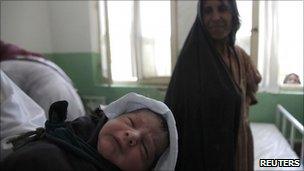Midwife shortage costing lives, says Save the Children
- Published

Many women's lives could be saved by access to basic maternal healthcare
One in three women worldwide gives birth without expert help, a study from UK charity Save the Children suggests.
It said if a global shortage of 350,000 midwives were met, more than one million babies a year could be saved.
Some 1,000 women and 2,000 babies died every day from easily preventable birth complications - Afghanistan was the worst place to have a baby, it said.
The charity urged world leaders to show the political will to improve access to midwives and healthcare globally.
'Not complicated'
Save the Children, which is launching a campaign for more midwives, said more babies in poorer countries died from lack of oxygen at birth than from malaria.
It said women in the poorest countries were the least likely to have a skilled attendant present at delivery, were much more likely to lose their child and were the most likely to die during childbirth.
Each year 48 million women around the world give birth without expert help, the study found.
In Ethiopia, 94% of women gave birth without trained help, while in the UK the figure is only 1%, the charity said.
In the UK - where there are 749,000 births a year - there are 26,825 working midwives, while in Rwanda, where 400,000 babies are born a year, there are only 46.
Afghanistan has one of the highest infant mortality rates, with 52 in every 1,000 births ending in death.
The report said Afghan women faced a one in 11 risk of dying from complications during pregnancy and childbirth. One in five children dies before the age of five.
Many babies in Afghanistan die because of traditional practices, such as placing them on the floor to ward off evil spirits, which can cause infection, it said.
Despite what Save the Children describes as terrible statistics, Afghanistan is improving, the 大象传媒's Paul Wood in Kabul says.
Since 2002, some 2,400 midwives have been trained. The number of women in rural Afghanistan whose deliveries are attended by skilled personnel has increased from 6% to 19%, the report says.
Justin Forsyth, chief executive of Save the Children, said no mother should face giving birth without help.
"It doesn't have to be complicated. Someone who knows how to dry a baby properly and rub its back to help it breathe can make the difference between life and death. No child is born to die."
Mr Forsyth called on governments around the world to put health workers at the heart of their plans.
"World leaders pledged to do just that last year, but now they need to deliver the funds and political will to support this pledge. Without it, mums and babies will continue to die needlessly every day," he said.
- Published22 September 2010